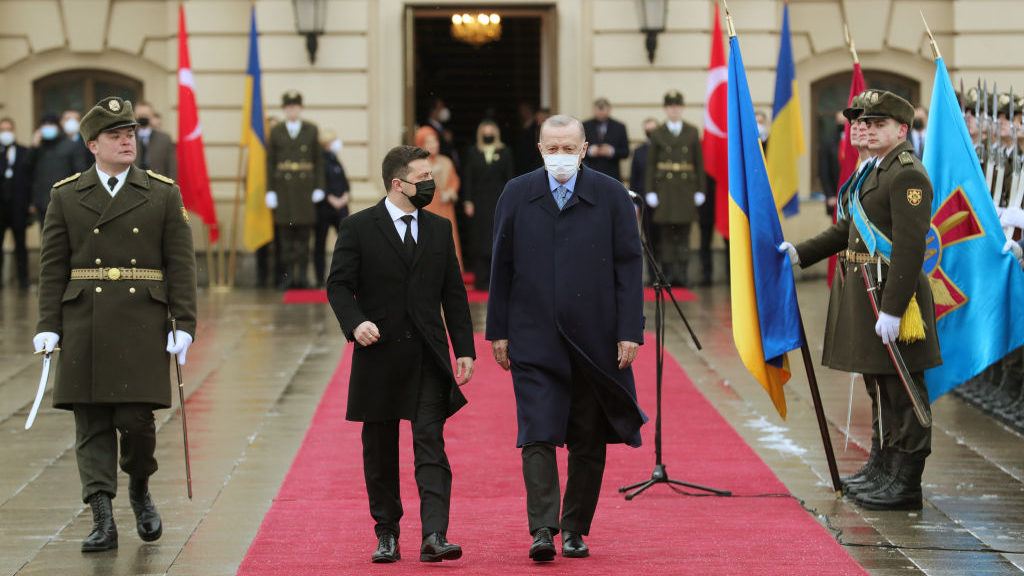Erdoğan Pushes for Russia-Ukraine Meeting as Prospect of War Looms
Concerned about the political and economic fallout of a Russian invasion of Ukraine, Ankara wants to play role as mediator amid fears Moscow could escalate the conflict
Turkish President Recep Tayyip Erdoğan continued his push for a trilateral meeting with the leaders of Ukraine and Russia amid fears that his country risks wide-ranging political and economic fallout if Moscow carries out a major military action against its southern neighbor.
On Wednesday, the Turkish president told reporters that he would ask Russian President Vladimir Putin to consider a meeting with Ukrainian President Volodymyr Zelenskyy in Turkey, the state news agency reported.
Zelenskyy has said he is open to such a meeting, according to Erdoğan.
Ankara has a wide range of economic, security and geopolitical interests in de-escalating the crisis in Ukraine, sparked by what NATO says is more than 100,000 Russian forces massed on the Ukrainian border, raising fears of an attack or invasion.
“Turkey would become collateral damage,” said Atilla Yeşilada, an Istanbul-based economist.
Turkey relies on both Ukraine and Russia for tourism, a key sector for the country’s economy, as well as natural gas from Moscow and increasing trade with Ukraine.
The Kremlin claimed Wednesday that it had started pulling back some of its troops following military exercises, although NATO said it had not seen evidence of that. A senior US official told several media outlets on Wednesday that Russia has moved as many as 7,000 additional troops to the border with Ukraine in recent days, for an estimated more than 150,000 Russian troops sitting at the border.
The crisis could further escalate, in the wake of a Russian parliament proposal to recognize the self-declared separatist republics in rebel-held east Ukraine.
Russia has denied it wants to invade Ukraine, but has demanded that NATO issue a guarantee that it will not accept Ukraine into the military alliance, which NATO has rejected.
Turkey would become collateral damage
Give the gift of hope
We practice what we preach:
accurate, fearless journalism. But we can't do it alone.
- On the ground in Gaza, Syria, Israel, Egypt, Pakistan, and more
- Our program trained more than 100 journalists
- Calling out fake news and reporting real facts
- On the ground in Gaza, Syria, Israel, Egypt, Pakistan, and more
- Our program trained more than 100 journalists
- Calling out fake news and reporting real facts
DONATEJoin us.
Support The Media Line. Save democracy.

Since both Russia and Ukraine, as well as Turkey, have coastlines on the Black Sea, the crisis also poses a geopolitical and security risk for Ankara.
Historically, Russia and Turkey have not been allies and Turkey has suffered heavy casualties in Syria where they are on opposing sides of Syria’s long-standing civil war.
“A war bodes no good for the well-being of the region,” Erdoğan said, according to the state news agency.
Erdoğan previously suggested a meeting in Turkey with the Russian and Ukrainian leaders earlier this month when he visited Zelenskyy in Kyiv.
The state news agency also reported that the Turkish foreign minister spoke by phone with the Ukrainian and Russian foreign ministers and told them that Ankara could mediate between the two countries.
Yeşilada told The Media Line that, while Turkey would be significantly impacted if Ukraine’s economy was damaged due to Ankara’s trade surplus with Kyiv, Erdoğan cannot take a hard line with Putin.
“Turkey does not dare to be extremely aggressive in defending Ukraine simply because Russia has in the past punished Turkey severely for what it considers acts against its interests,” said Yeşilada.
Russia applied a tourism and agricultural products boycott after Turkey shot down a Russian jet in 2015 that Ankara said came into Turkish airspace, although the Kremlin denied it did so.
Relations eventually thawed and Erdoğan has since strengthened his country’s ties with Russia, including the purchase of an anti-missile defense system, angering Washington.
“I think the West is really doubtful whether Erdoğan is still a member of, broadly speaking, the Western alliance,” Yeşilada said.
“Any further movement toward the Russian orbit is going to be greeted with anger or displeasure,” he added.
Erdoğan also has provided support to Ukraine, including selling it military weapons, such as long-range drones.
Turkey does not dare to be extremely aggressive in defending Ukraine simply because Russia has in the past punished Turkey severely for what it considers acts against its interests
Timothy Ash, an economist with a focus on Turkey and Ukraine, said the Turkish president knows that the US will approve of such policies.
Ash agreed that Turkey would likely suffer some of the biggest losses if there is an escalation in Ukraine.
“Erdoğan has done a very delicate balancing act between Russia and Ukraine,” he said. “Does Erdoğan have to choose NATO over Russia and Ukraine over Russia? So that’s a political challenge for him.”
Aykan Erdemir, a former member of the Turkish parliament with main opposition party CHP, or Republican People’s Party, told The Media Line that Erdoğan’s position within NATO would improve if he was seen as a mediator between the two countries.
However, Erdemir, now a senior director for the Turkey program at the Foundation for Defense of Democracies, said that it is doubtful that Moscow would accept such a role for Erdoğan, since both Turkey and Ukraine are important to each other’s defense sector.
“Over the last few years, Ukraine has emerged as the leading source of engine and aviation technology for Turkey’s defense industry, and a Russian invasion would deal a blow to Ankara’s ambitions for deepening defense cooperation with Kyiv,” Erdemir said.

